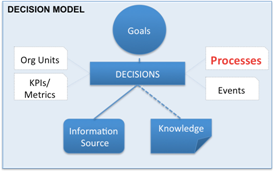All systems are active participants in business decision making to some degree.
The logic coded into business systems allows a level of ‘smartness’, and this is then amplified by the decision logic used by users – resulting in smart business operations. So, if we want to make the entire business operations smarter, we need to focus on decision making across systems and their users. Business Decision Management seeks to explicitly define and improve operational decisions; and to automate them through targeted deployment of sophisticated decision management technologies like Business Rules Management, Advanced Analytics and Optimization.
As we automated business operations over the years we have hobbled them with unmanageable decision logic programmed into business systems. Even worse, since decisions have not been formally modeled and implemented in systems, some critical but routine decision-making has been consigned to business users. Therefore automation efforts are handicapped and limited by the availability of skilled operators who can either specify the decision logic to be (hard) coded into business systems; or who can be available to provide decisions every time the business system stops for ‘input’. In the former case these systems cannot be changed rapidly as business conditions change; and in the latter case, these systems cannot run unattended.
It is therefore important to tackle the implicit Decision Management head-on so that all implied decisions in business operations can be extracted, modeled and laid out for analysis. Once decisions are visible they can be automated and improved. Not all decisions are candidates for automation but all are candidates for improvement.
Let us examine some major classes of systems and highlight the implied decisions in them.

Smarter Processes – Transactional Systems
Most business systems are geared towards automating business processes. The earliest process analysis techniques approached this as a Data Flow Diagram – specifying data flows through bubbles of process logic, which is really the decision logic.
The decision logic is required to make one or more of the basic operational decisions – like validation, calculation or routing – based on a series of conditions. For simpler business system components programming logic was written to automate these decisions – and that was sufficient for a while. As the frontiers for automation were pushed out further and further, the decision logic embedded within automated business processes became progressively complex. Now whenever the business environment changes requiring a change to business decision logic, the effort to change business systems is frequently unfeasible.
Business process management is an approach that allows a level of transparency into transactional systems. The goal is to allow rapid change to automated processes as the business environment changes; and this is achieved by inserting configurable ‘decision-logic’ into automated process shells. This does achieve a semblance of agility for a particular elemental process at a very detailed level, but since a higher-level decision model does not exist to tie all decisions together the agility cannot be expressed in gross business terms.
Ideally, a hierarchical decision model should be built out in parallel to the usual process modeling techniques – taking care that all business decisions that used to be embedded within processes are explicitly pulled out into the decision model. Not only does this approach enable a clear focus on decisions, it also allows implementation of specialized technology stacks for business decision management and for business process management.
Smarter Dashboards – Business Intelligence Systems
Business Intelligence dashboards and reports are known as ‘Decision Support Systems’ since they support business decisions made by business users. The irony is that the requirements and design of these systems does not consider decisions explicitly. Implementation is heavily focused on user interface requirements, and therefore on individual or a team’s implicit decision models. No wonder most projects and maintenance teams are constantly chasing the next set of requirements from the next set of users in a never-ending game of whack-a-mole.
Dashboards and Visualization are key elements for human decision-making – and their implementation needs to be based on decision models – not just on information models and process models. Most operational and tactical business decisions can be standardized and need not depend on individual preferences. In fact, one of the key goals of most organizations is to be able to make consistent decisions aligned with strategic metrics – for governance, risk-management and compliance with regulations.
An explicit decision model allows all business users and functional teams to have a basis for discussion and building consensus on how they make decisions and how all levels of decisions can be tied back to Key Performance Indicators and business operations.
Smarter Portals – User Experience Systems
Portals like self-service systems are business workflows. They are intended for users to interact with systems – and with other users. This is because most systems are set up for ‘interrupted processing’ where the systems churns through automated processes and then stop for user input – which is almost always a decision.
Given that a portal needs to be designed such that users can make the best possible decisions, it is important to understand those decisions better. What are the goals of the user that the decision needs to support? What are the information requirements? What is the expertise or insight needed? Are there any business policy or business rule constraints that are going to limit the decision?
A complete Decision Model will show how the automated decision logic within systems relates to the user’s decisions required for that business operation. This will allow the most effective use of technology with the automation boundary drawn at the most appropriate point. In addition, the entire business operation will be much more efficient since the shared decision-making has been made explicit and seamless.
Decisions First
Getting smarter as an organization is a critical requirement for competitive advantage. This ‘smartness’ lives in our people, our systems, our processes, our data and our culture – all of them driving business decisions and business actions. It follows therefore that to get smarter, we need to examine Decisions First.

















